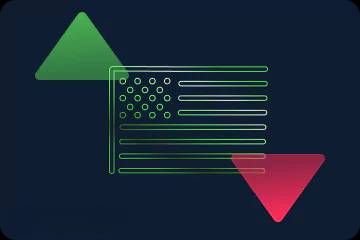Beginners
CFDs

In the modern world of rapidly increasing digitalisation, online CFD trading has earned the title of one of the most popular forms of trading. Compared to investing in company shares that’s been around for hundreds of years, CFD trading is still relatively new, and some beginner traders lack an understanding of how it works. But what are CFDs? This article will explain what this term stands for and the main benefits of CFD trading.
What are CFDs?
A contract for difference (CFD) is a financial derivative product that allows a trader to speculate on the price movements of underlying assets without buying them. A contract for difference means an agreement between a trader and what a CFD broker to exchange the difference between the opening and closing price of a trade.

What is the difference between investing in shares and CFD trading?
In online trading, financial instruments can be divided into two main categories – those that change hands (also called cash instruments) and those that don’t (derivatives). This difference determines whether you are required to buy an underlying asset to trade it.
The most common example of cash instruments is shares of a company. A trader is required to buy a share to trade it. Once you own a share, you can actively trade it. However, most traders see them as a long-term investment, buying and holding them for an extended period of time, hoping to capitalise on their growth value.
Derivatives (which is what CFD is), on the other hand, are very popular among short-term day traders. A derivative is a financial instrument that has its price based on an underlying asset, such as a forex pair, stock, commodity or other but has a different set of trading conditions and practices. There are many different kinds of derivatives. For example, options and futures are among the most common ones and have been around for decades. However, CFDs have also become popular among traders and are now one of the most traded types of derivatives.
Why trade CFDs?
CFD trading has numerous benefits that attract thousands of traders worldwide. Here is why they are drawn to them:
Access to multiple financial markets at once
When you trade CFDs, you are not limited to the stock market or forex. You have a large pool of financial instruments in one place. With Forexbeats, for example, you can trade CFDs on over 4,000 instruments on various global markets – forex, stocks and stock indices, commodities, cryptocurrencies, exchange-traded funds (ETFs) and futures.
Flexible lot sizes
CFD trades don’t require you to trade a full lot at once. You can place a trade on just a fraction of it. For example, one standard lot of any forex pair is 100,000 units of currency. When you trade CFDs on Forexbeats, you can trade from as little as 0,01 lot.
Trading opportunities on both rising and falling markets
Crashing markets are usually bad news for long-term investors because it always means the depreciation of their portfolios. CFD traders, on the other hand, are more receptive to falling markets because they present multiple opportunities to short-sell financial instruments.
Low starting capital
Since traders don’t have to purchase an underlying asset when they place a CFD trade, the required trading capital is much lower. Depending on the instrument, market and trading conditions a CFD broker sets, you can open a trade with as little as a few dollars. With Forexbeats, you can start trading with as little as USD 10.
Large market exposure
CFDs are traded with leverage, which allows traders to open larger trades with a smaller amount of capital. Leverage of 500:1, for instance, allows traders to open a position 500 times larger than their trading capital. However, with the opportunities leverage brings to CFD trading, it also adds a risk of losses larger than the initial capital if risk management tools are not utilised.
Demo accounts
It is also important to note that despite offering multiple advantages, CFD trading presents a certain risk for traders as well.
